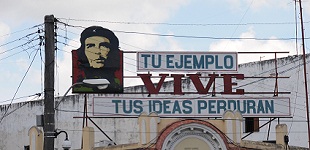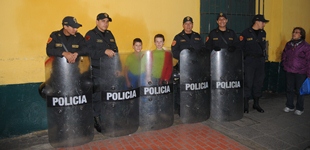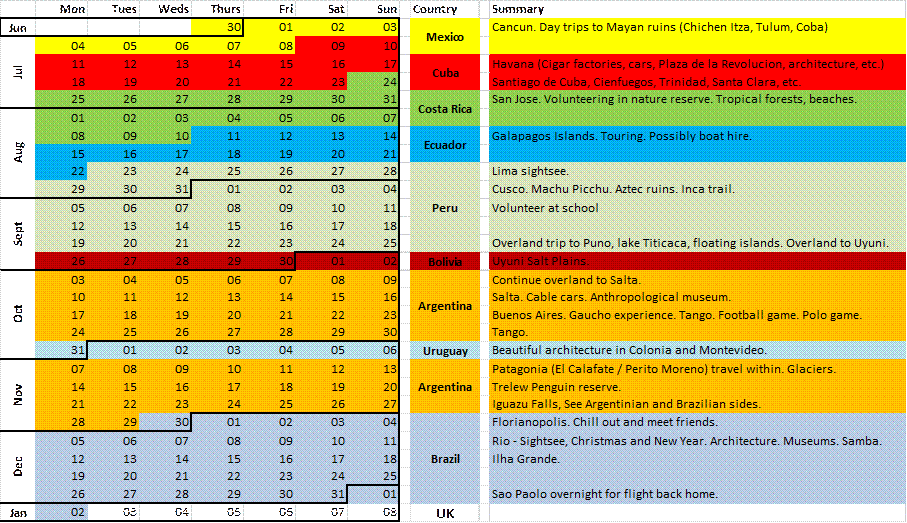
Che in pylons
Che was a hero of mine in my teens, as he was to millions of others. I was riveted by castaneda’s biography of him, Companero, found The Motorcycle Diaries a fun and insightful read, and his Bolivian Diaries eery as they continued to the day before his assassination. However, visiting Cuba and seeing the plight of many Cubans, a resourceful people living in relative poverty in a country resplendent in untapped opportunities, made me question my views on him.
Che died a revolutionary. He spent much of his adult life in revolutions on behalf of the poor and the oppressed. Despite taking these to many countries in South America and Africa, the only one that succeeded was in Cuba. There, he spent a comparatively small amount of his time trying to turn the victory into a durable and sustainable system that would continue with the same moral direction of the revolution he led. The skills of the people who are the change agents and create momentum are rarely the same as those required to successfully maintain that momentum.
Did he leave Cuba and go to Bolivia to continue down the revolutionary’s path because revolution was his strength? Or to continue his Bolivarian dream for South America? Or was it becoming clear to him that the Castros would not leave much room for other leaders?
Or was there a realisation that not all men were Che, that not all men and women would strive to do the right thing just because it is the right thing to do, that not all men and women would sacrifice for a belief in the greater good, and that once the heat and adrenalin of revolution dissipated, injecting the same fervour into the mundane would be beyond the discipline of the average man or woman and too lacking in instantaneous satisfaction?
It makes interesting reading to go through the speech that Che Guevara gave at a conference hosted by the US back in the mid 60s to try to launch a pan-American economic union (CIES, which I read in a book of 3 Che speeches on Latin American freedom, ‘Punta del Este’). In his speech, entitled ‘Cuba does not believe in the separation of politics from economics’, he cites the words of Cuba’s founding father, Jose Marti. Marti said presciently that a country is not independent if it has a predominant supplier relationship with a single other country, but rather if it has a variety of supplier and buyer relationships with many. Having a trading partner who too much of your economy depends on leads to political subjugation. Che clearly (and correctly) identified this as the US’s goal of the current symposium, and refused on behalf of Cuba to play ball.
I cannot dispute his logic or his argument, and admire the clarity and courage of that speech to the conference. The challenge was, however, that Cuba under the Castros only used this logic against the US, and leapt into a similar relationship with the eager USSR. There were definitely pragmatic reasons for doing this at the time. The US had throttled the Cuban people fairly instantaneously and effectively with caps on sugar imports, the lifeblood of the Cuban economy, and then the embargo, and the Soviet Union had stepped in to buy the sugar at the prevailing rate. However, that the words of Marti with regards to overdependence on one economic partner, repeated by Guevara, were either not heeded or were poorly implemented in subsequent economic planning by the Castros has not helped Cuba’s people. And history looks like it is repeating itself now with China. In fact, as a part of the propaganda drive, we saw a fascinating exhibit in the Museum of the Revolution in the Hall of Mirrors, where China was being sold to the visiting public. Stunning pictures of beautiful countryside, a smiling people and earnest industry from Cuba’s new Chinese friends.
(As an aside, I was somewhat disturbed to see a Caterpillar bulldozer as an exhibit in Santa Clara at the site of the short battle where the tide turned decisively against the Batista regime. With a group of 19 men, some barely out of their teens, Guevara had by use of a bulldozer and Molotov Cocktails routed 350 government troops on a train, cut the supply lines between the opposition in the north and south of Cuba, and taken a large arsenal of weaponry. I was disdained that a Caterpillar bulldozer had been chosen for the exhibit, as Caterpillar are raking obscene profits from illegal and immoral Israeli destruction of Palestinian houses in the Palestinian occupied territories and in Israel. Che would certainly not have approved. However, it turns out that it was the original bulldozer used, so I was quietly happy that Caterpillar had made no money from his taking of this tractor from its owners to use as a weapon against imperialism! End of aside.)
Che Guevara, and the lesser known Cuban Camilo Cienfuegos affected regime change at the age of 28. They were taking surrender from platoons of the corrupt Batista regime at an age when most of us in the West were focussing on earning our next buck or finding our next drink. To say they were products of their culture or of their circumstance would be an easy excuse for those of us who haven’t stood up for what we believe in. Guevara and Cienfuegos chose the paths that they took – they could have taken easier routes like most did. Paths of potential great consequence are also open to us everywhere in the world, but very few of us choose to go down them. And in many ways, that is the failing of any system like Communism that depends on the individual realisation of the greater good, namely that not enough people choose to live their lives on that basis for those systems to succeed.
So I found myself at the end still in admiration for Guevara, and reaching the conclusion as many Cubans seemed to, that the current state of Cuba’s economy and her people’s relative poverty has more to do with the systems implemented by the Castros since they took power than it does with a revolutionary who died nearly half a century ago. His constant drive for his beliefs, his refusal to give less than all, and the concluding proof where he gave his life in furtherance of his beliefs stands as an ultimate example to us all in my view. The US and mafia sponsored Batista regime that he helped overthrow was by all accounts corrupt and not in the interest of Cuba or her people. The unlikely revolution that Che, Camilo, and Fidel led was absolutely in the people’s interest. It is just tragic that the surviving member of that triumvirate has taken the fruits of that revolution in the direction that he has, and made the wonderful and resourceful Cuban people suffer as a result.
There is much talk in Cuba of ‘la lucha’, the struggle. But today it is mainly confined to the heroics that many people have to go through to make their own ends meet. And though there is a real feeling of community, and people helping each other out, there doesn’t seem to be a drive for a greater lucha, a struggle for a better place for all. Change is certainly happening in Cuba today, as businesses are opening and more private ownership is becoming legal. But you can’t help but wonder if someone with Guevara’s spirit were there today, whether they would be pitted against the Castros and their regime, despite the Guevara worship that they continue to foster.
As I was teaching my eldest two boys about him and what he did back in Santa Clara, three ageing but beaming women came over to talk to us from the next table. They loved the fact that we were taking the time to explain his life and significance with our boys. They were clearly inspired by Che, and like him, were Argentinian. Our trip will take us to Argentina, the country of Che’s birth, and Bolivia, where he was killed by Bolivian troops acting under US instruction. It will be fascinating to see to what extent, if any, his presence will be still apparent in either country.
It is a testament to the power of ideas that despite Guevara’s record which could at best be described as mediocre in terms of successful revolutions, he became the number one enemy to the USA. That the largest power on the planet in its day would be so concerned about a man armed only with ultimate determination and an aspiration for his people should be an inspiration to us all.








Just had a look at the video about the school. It looks fascinating. Look forwarwd to hearing how you get on there.
Andrew, I’ve just posted up some more info about the school now that we’ve completed a week of volunteering there. Interested in what you think, though my commentary is very high level.
iyas